As cryptocurrency continues to grow, it’s become more difficult to find the right wallet through which you can manage our assets. So for your ease, we have compiled a list of top 10 crypto wallets that you can use right away to properly manage your digital assets.
Whether you’re a beginner or a seasoned trader, there’s a wallet for every need.
Detailed Analysis of Top 10 Best Crypto Wallet
Here are the top 10 crypto wallets you should definitely use if you’re looking to trade in 2025 and beyond.
| Wallet Name | Unique Features | Supported Tokens | |
| MetaMask | Integrated token swapping, multi-wallet management, and seamless dApp access. | Ethereum, ERC-20 tokens, Binance Smart Chain, Polygon. | Download MetaMask |
| Binance Wallet | Built-in NFT marketplace, yield farming, and integration with Binance exchange. | BNB, Bitcoin, Ethereum, and more. | Try Binance Wallet |
| Coinbase Wallet | Built-in dApp browser, multi-chain support, and QR code-based transfers. | Bitcoin, Ethereum, Solana, and ERC-20 tokens. | Explore Coinbase Wallet |
| OKX Wallet | Cross-chain swaps, DeFi and NFT integration, and advanced staking dashboard. | Ethereum, Binance Smart Chain, Avalanche, Solana, Bitcoin. | Start with OKX Wallet |
| Bybit Wallet | Built-in portfolio tracker, staking and yield farming, and exchange integration. | Ethereum, Binance Smart Chain, Polkadot, Bitcoin. | Download Bybit Wallet |
| Trezor | Open-source firmware, touchscreen interface (Model T), and password manager. | Bitcoin, Ethereum, and over 1,000 cryptocurrencies. | Get Trezor Wallet |
| Ledger | Bluetooth connectivity, multi-currency support, and Ledger Live app integration. | Bitcoin, Ethereum, Solana, and 5,500+ cryptocurrencies. | Shop Ledger Wallet |
| SafePal | Air-gapped hardware wallet, QR code transactions, and multi-platform access. | Ethereum, Binance Smart Chain, Solana, and over 10,000 cryptocurrencies. | Buy SafePal Wallet |
| Exodus | Built-in exchange, portfolio tracking, and multi-platform compatibility. | Bitcoin, Ethereum, Solana, and over 200 cryptocurrencies. | Download Exodus Wallet |
| Trust Wallet | Integrated staking, dApp browser, and Layer 2 support. | BNB, Ethereum, Solana, and 4.5 million assets across 65 blockchains. | Get Trust Wallet |
Now, let’s take a look at the top 10 wallet for crypto investments and see which ones fit your requirements.
OKX Wallet – Best crypto wallets

OKX Wallet is a non-custodial crypto wallet which is offered by the popular OKX exchange. It supports multiple blockchains including Ethereum, Bitcoin, Binance Smart Chain and Avalanche. This crypto wallet is designed for traders, NFT enthusiasts and DeFi users by integrating easily with the OKX ecosystem. It is free to use with transaction fees determined by the respective blockchain network.
This crypto wallet has strong security features with locally encrypted private key storage and 2FA. As a non-custodial wallet, it ensures that users retain full ownership of their assets. Additionally, users can connect the wallet to hardware devices like Ledger for enhanced safety. Just recently, OKX Wallet launched “Alpha Traders”. It is a community created for the Onchain generation. Additionally, it is an invite-only community for the influential Onchain generation.
Features
- DeFi and NFT Integration: Users can access DeFi apps, stake tokens, and trade NFTs directly within the wallet. This makes OKX Wallet a one-stop solution for decentralized activities.
- Cross-Chain Swaps: Easily exchange assets between different blockchains using the wallet’s integrated cross-chain swap feature.
- Staking Options: The wallet offers a comprehensive dashboard for staking rewards, with options to stake across various blockchains.
- Hardware Wallet Support: Connect the wallet to devices like Ledger for more secure transactions and storage.
Pros
- Excellent multi-chain and cross-chain compatibility.
- Built-in access to DeFi and NFT platforms.
- Strong staking features with high rewards.
- Easy-to-use interface for beginners and advanced users.
Cons
- Relies on the OKX ecosystem for optimal functionality.
- Advanced features may overwhelm novice users.
Binance Wallet – Best crypto wallets apps
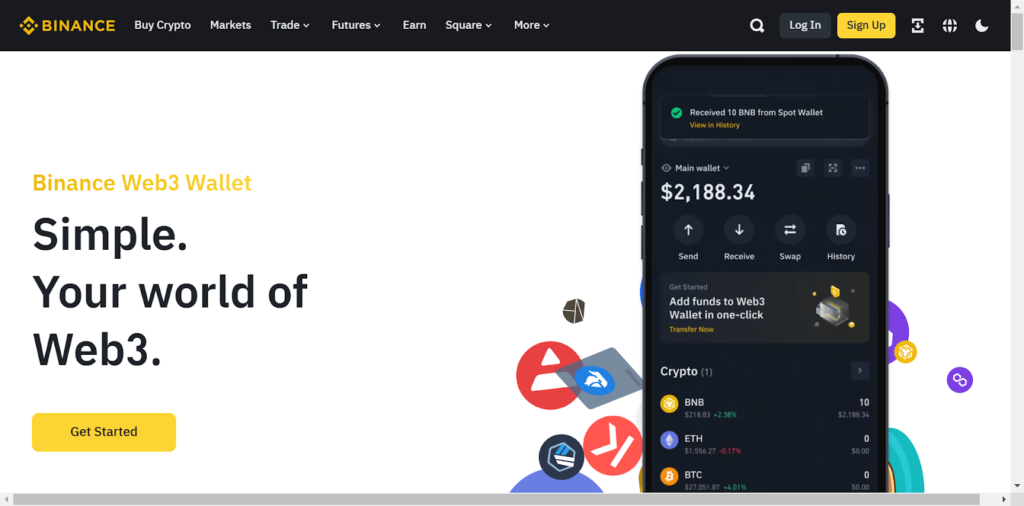
Binance Wallet is a non-custodial wallet provided by Binance, one of the largest cryptocurrency exchanges in the world. It supports multiple blockchains including Binance Smart Chain, Ethereum and many more that makes it versatile for traders and investors. This is one of the top 10 crypto wallets and is free to use but you can’t run away from paying the transaction fee.
The wallet is tightly integrated with the Binance exchange. It allows users to move funds seamlessly between their trading accounts and wallets. It also supports staking which enables users to earn rewards directly through the wallet. Additionally, Binance Wallet has a built-in NFT marketplace, making it a great choice for NFT enthusiasts.
The Binance Web3 Wallet prioritizes security with private key encryption and multi-signature protection. Users also have an option to connect their wallet to hardware wallets like Ledger to increase the protection of their wallets. Binance Wallet recently introduced support for Solana-based tokens and launched an updated staking dashboard which makes it easier for users to track rewards. It has also enhanced its NFT platform by adding cross-chain compatibility for NFT trading.
Features
- Cross-Chain Transfers: Binance Wallet makes it easy to move assets between Binance Chain, Ethereum, and other supported blockchains. This feature eliminates the need for third-party services.
- Integrated NFT Marketplace: Users can buy, sell, and store NFTs within Binance Wallet without needing additional platforms. The wallet also supports cross-chain NFT trading.
- Yield Farming and Staking: Binance Wallet enables users to stake supported tokens and earn rewards directly. The wallet offers an intuitive dashboard for tracking staking performance.
- Secure Asset Fund: The wallet is integrated with Binance’s Secure Asset Fund for Users (SAFU). This acts as an insurance fund against unforeseen breaches.
Pros
- Seamless connection with Binance exchange.
- Multi-chain support for diverse assets.
- Offers staking and NFT features.
- Free to use with customizable transaction fees.
Cons
- Heavily reliant on Binance’s ecosystem.
- Limited advanced features for developers.
MetaMask – Best crypto wallets online
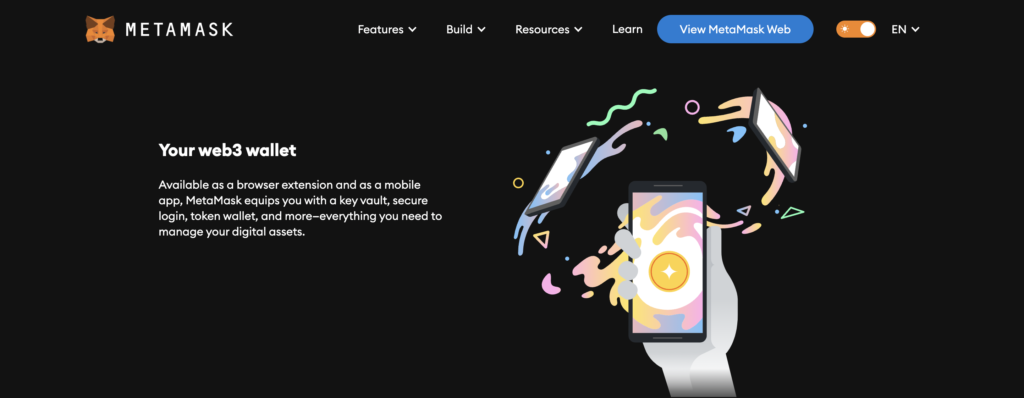
MetaMask is one of the most popular crypto wallets and probably #1 in the list of top 10 crypto wallets. It’s widely known for its simplicity and integration with the Ethereum ecosystem. Available as a browser extension and mobile app, it supports Ethereum and ERC-20 tokens which makes it a favorite among DeFi users and NFT enthusiasts.
This crypto wallet has over 30 million monthly active users, making it a leader in the decentralized wallet solutions. It is also free to use but you’ll incur some gas fees for transactions based on network activity.
The features that make MetaMask stand out is its seamless integration with dApps and DeFi platforms. It offers features like token swapping directly from the wallet and support for hardware wallets like Ledger and Trezor. Additionally, the customizable gas fee options let users prioritize transaction speed or cost which gives more control over the user experience.
MetaMask uses advanced security features like password protection and a 12-word seed phrase for wallet recovery. However, since it is a software wallet, users must be cautious of phishing attacks and malware that target private keys stored on the device.
Recently, MetaMask introduced multi-chain functionality, allowing users to interact with non-Ethereum blockchains like Binance Smart Chain and Polygon. Moreover, MetaMask is enhancing its privacy features by integrating zk-SNARK technology which aims to make transactions even more secure.
Features
- Multi-Wallet Management: MetaMask allows users to manage multiple wallets in one interface, making it easier for those dealing with several accounts. You can quickly switch between wallets without logging in and out, saving time and effort.
- Integrated Token Swapping: With MetaMask, users can swap tokens directly within the wallet, avoiding the need for external exchanges. It also provides real-time market rates from multiple sources.
- Multi-Chain Support: MetaMask supports not just Ethereum but also Binance Smart Chain, Polygon, and other EVM-compatible chains.
- DeFi and NFT Compatibility: The wallet easily integrates with DeFi apps and NFT marketplaces. This feature allows users to interact with lending platforms, yield farming and even buy or sell NFTs directly.
Pros
- Easy to use and widely accessible.
- Strong integration with DeFi and NFT platforms.
- Hardware wallet compatibility for enhanced security.
- Free to use with customizable transaction fees.
Cons
- Limited to Ethereum and EVM-compatible chains.
- Vulnerable to phishing and malware attacks if not used carefully.
Coinbase Wallet – Best crypto wallet for beginners
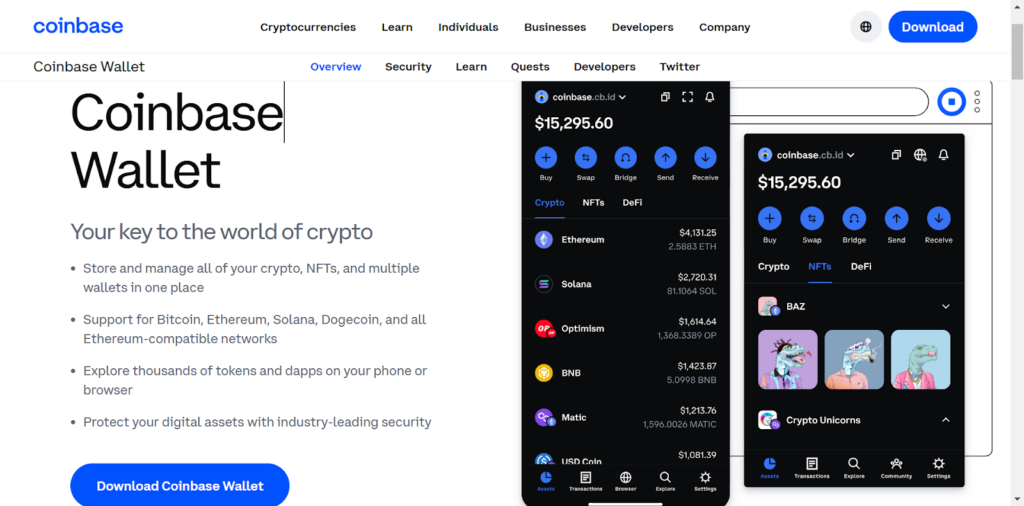
The next one of the top 10 crypto wallets is Coinbase. It is a self-custodial wallet designed by the Coinbase exchange which is one of the most trusted names in cryptocurrency. Unlike the Coinbase exchange wallet, Coinbase wallet gives users full control over their private keys which provides a secure way to manage their crypto assets. It supports a wide range of cryptocurrencies including Bitcoin and ERC-20 tokens.
What makes Coinbase Wallet unique is its built-in decentralized application (dApp) browser. The wallet also allows users to explore NFT marketplaces, DeFI platforms and other Web3 services directly from it. Additionally, Coinbase Wallet supports multi-chain assets which includes Solana and Avalanche. Moreover, its QR code-based transfer system allows quick, fee-free transactions between Coinbase Wallet users.
Coinbase Wallet uses strong security features such as biometric authentication, two-factor authentication (2FA) and encrypted private key storage. There’s also a 12-word recovery phrase so you can recover your account in case you forget your password. There’s also an optional cloud backup for private keys which makes it easier to recover lost access.
Coinbase Wallet has recently added support for staking Solana and Avalanche tokens, further expanding its DeFi capabilities. The wallet also introduced multi-network bridging which allows users to move assets across supported blockchains seamlessly.
Features
- Built-in dApp Browser: Coinbase Wallet’s built-in browser allows users to access decentralized apps without switching platforms. This feature is ideal for exploring DeFi.
- Multi-Asset Support: The wallet supports Bitcoin, Ethereum, Solana, and many ERC-20 tokens. Its support for emerging blockchains like Avalanche makes it future-ready.
- QR Code Transfers: Users can transfer assets quickly by scanning QR codes. It avoids the hassle of entering wallet addresses. This feature is particularly useful for peer-to-peer transactions.
- Cloud Backup Option: Coinbase Wallet offers an optional secure cloud backup for private keys which reduces the risk of losing access. This feature is perfect for users who value convenience.
Pros
- User-friendly design for beginners and advanced users.
- Strong security features, including biometric and 2FA.
- Direct integration with Coinbase exchange for seamless transfers.
- Expanding support for NFTs and staking.
Cons
- Heavy reliance on Coinbase for full functionality.
- Limited advanced features for professional traders.
Bybit Wallet – Best crypto wallets free

Bybit Wallet is a newly launched non-custodial wallet by the Bybit exchange. It is designed to offer users full control over their crypto assets. Supporting multiple blockchain, it offers trading opportunities to traders and investors seeking a secure and versatile wallet. The wallet is completely free with fees only applying if you make blockchain transactions.
This is one of the top 10 wallet for crypto that integrates easily with Bybit’s trading platform which enables users to transfer assets easily. The feature you’ll like best in this is its built-in portfolio tracker which allows you to monitor asset performance across different blockchains. The wallet also supports staking and yield farming.
Bybit uses advanced encryption for private key storage along with biometric authentication for mobile devices. Its optional cold wallet integration ensures additional layers of security for large portfolios. Additionally, the wallet recently introduced a real-time portfolio analysis feature providing insights into asset allocation and performance.
Features
- Portfolio Tracker: The wallet comes with a built-in tracker that displays real-time performance across multiple assets. It provides insights into portfolio diversification and market trends.
- Staking and Yield Farming: Bybit Wallet allows users to participate in staking and yield farming directly from the app. This makes it easy to earn passive income on supported tokens.
- Multi-Blockchain Support: Bybit Wallet supports Ethereum, Binance Smart Chain, Bitcoin, and emerging blockchains like Polkadot. This ensures users can manage a wide range of assets without switching platforms.
- Cold Wallet Compatibility: Bybit Wallet supports cold storage options for users who prioritize asset security. This ensures funds remain offline and protected from potential cyber threats.
Pros
- Seamless integration with Bybit exchange.
- Advanced portfolio tracking and analysis tools.
- Strong support for staking and yield farming.
- Expanding compatibility with new blockchains.
Cons
- Limited advanced features for non-Bybit users.
- Early-stage wallet with fewer third-party integrations.
Trezor – Best crypto wallets offline
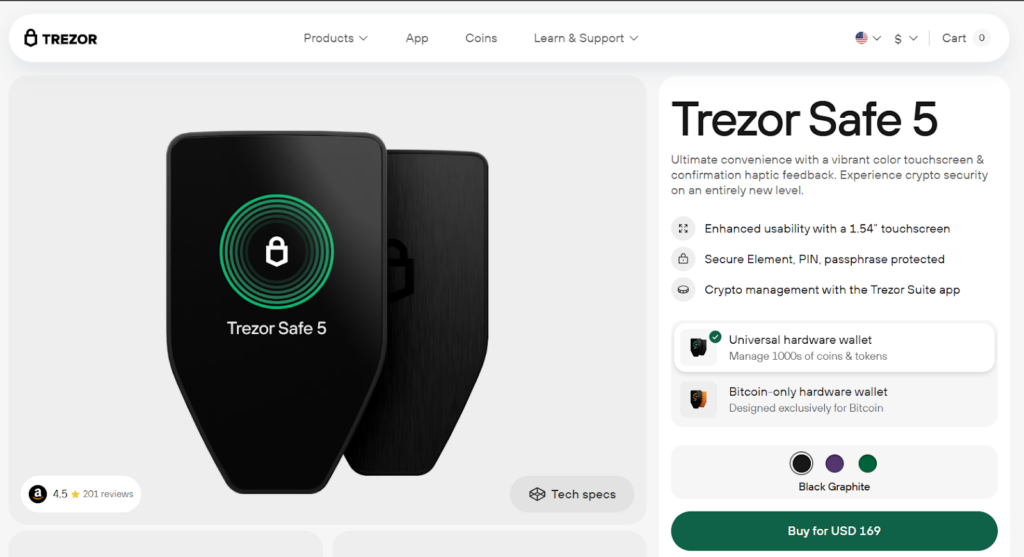
Trezor is one of the most trusted hardware wallets in the crypto industry which offers top-tier security for storing digital assets offline. It supports over 1,000 cryptocurrencies including Bitcoin, Ethereum and many altcoins. This hardware wallet is available in two models: the Trezor One which is typically sold for $69 and the Trezor Model T which costs around $219 and includes advanced features like a touchscreen.
This best hardware wallet has open-source firmware to ensure transparency and trust with the entire codebase publicly available for review. It also integrates with third-party wallets like MetaMask and MyEtherWallet for enhanced usability. The best part? The Model T is a more expensive version with advanced features such as full-color touchscreen and password management capabilities.
Trezor uses a secure PIN system and stores private keys offline which makes it immune to hacking attempts. It also provides 12 to 24-word recovery seed for account recovery. Meanwhile, the regular firmware updates keep the wallet secure against new threats. Now that Bitcoin is booming like crazy, the demand for Trezor hardware wallet is breaking records in customer demands.
Features
- Cold Storage Security: Trezor keeps your private keys offline, making it nearly impossible for hackers to access your funds. This provides peace of mind for long-term holders who prioritize security.
- Open-Source Firmware: The wallet uses open-source firmware, meaning its code is available for public review. This ensures transparency and allows the crypto community to verify its security.
- Touchscreen Interface: The Model T comes with a touchscreen that makes navigating and confirming transactions easy. It eliminates the need for physical buttons and provides a modern and user-friendly experience.
- Password Manager: Trezor allows you to store and manage your passwords securely. This feature adds extra utility for people looking to protect sensitive data.
Pros
- Industry-leading security features.
- Supports over 1,000 cryptocurrencies.
- Transparent, open-source firmware.
- Regular firmware updates to address emerging threats.
Cons
- Expensive compared to software wallets.
- Requires technical knowledge for setup and use.
Ledger – Best crypto wallet cold storage
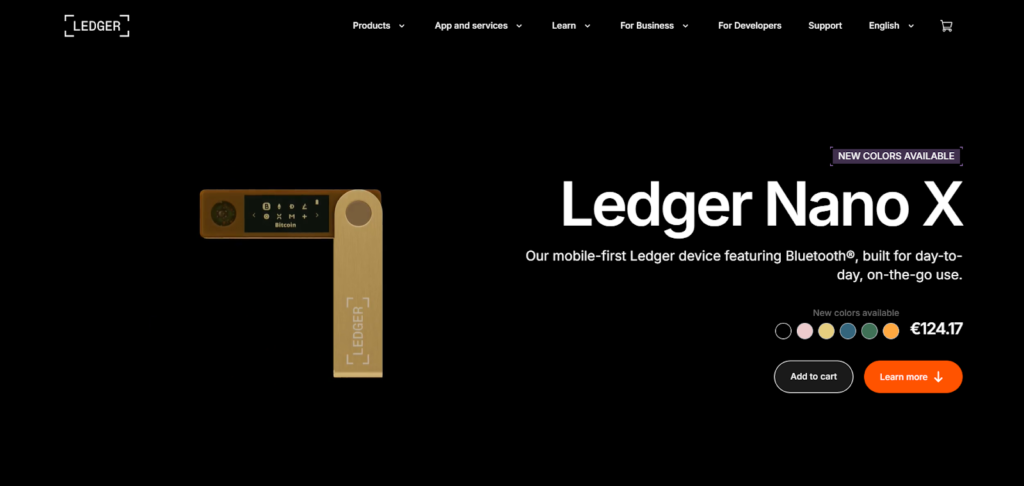
Ledger is a premium hardware wallet which is designed for secure cryptocurrency storage. The Ledger NanoX, its flagship model, supports over 5,500 cryptocurrencies and connects to mobile and desktop devices via Bluetooth or USB. This wallet is known for its strong security features and sleep design. All this makes it a favorite among long-term holders and active traders alike.
The features of this cold wallet for cryptocurrency that attracts most users is its Bluetooth functionality which allows for wireless use with smartphones. The Ledger Live app further enhances usability and provides a platform to manage assets, stake cryptocurrencies and even interact with DeFi applications.
Ledger uses a Secure Element chip (CC EAL5+ certified) for storing private keys. It ensures they never leave the device ever. Also, regular firmware updates make sure that the wallet stays protected against all emerging threats. And do you want to know something interesting? Ledger is giving away $70 in Bitcoin on some Ledger wallets and this offer is only valid till the supply lasts. So, if you’re looking to buy one, this seems like the best time.
Features
- Multi-Currency Support: Ledger wallets support over 5,500 cryptocurrencies which make them one of the most versatile options. This means you can manage all your digital assets in one place.
- Secure Element Chip: The wallet uses a CC EAL5+ certified secure chip. It provides enterprise-grade security and ensures private keys never leave the device.
- Bluetooth Connectivity: The Ledger Nano X features Bluetooth, enabling you to connect it to your smartphone wirelessly. This makes it convenient for users who prefer mobile crypto management.
- Ledger Live App: Ledger Live is a companion app that allows you to manage assets, stake tokens, and access DeFi platforms. It provides a user-friendly interface for beginners and advanced users alike.
Pros
- Exceptional security for offline storage.
- Compact and portable design.
- Easy-to-use app for managing assets.
- Regular firmware updates.
Cons
- Relatively expensive compared to other wallets.
- Bluetooth functionality may raise security concerns for some.
SafePal – Best crypto wallets software
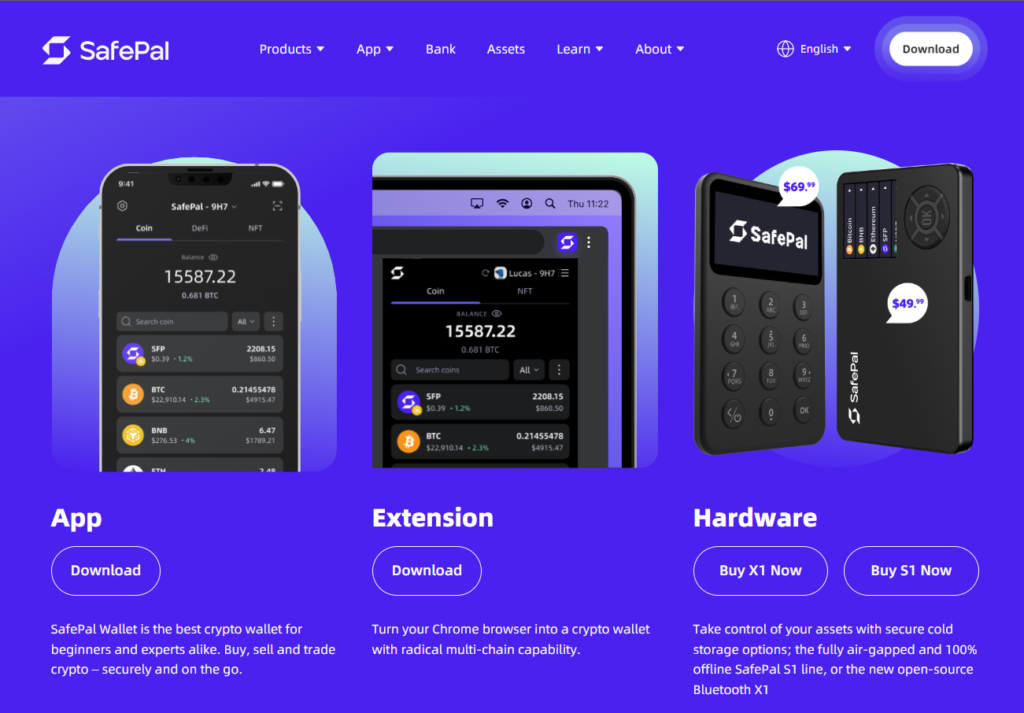
SafePal is a multi-functional crypto wallet designed to bridge the gap between hardware and software wallets. It supports over 30,000 cryptocurrencies and is compatible with 20+ blockchains which makes it a versatile choice for traders and long-term holders. SafePal offers both a mobile app and a hardware wallet which caters to users of all levels.
One of SafePal’s unique features is its multi-chain capability which supports a wide variety of assets and tokens. The SafePal S1 hardware wallet integrates with the mobile app to provide secure transactions without compromising convenience. It also features a self-destruct mechanism to wipe data if the device detects tampering.
SafePal prioritizes security by using advanced encryption technologies and a secure element chip in its hardware wallet. It uses a self-destruct feature that erases private keys if tampering is detected. The mobile app also offers security features such as fingerprint authentication and password protection. The best part? SafePal just recently partnered with BingX to boost liquidity and make trading more accessible.
Features
- Multi-Platform Access: SafePal is available as a mobile app and a hardware wallet, giving users flexibility. The hardware wallet is air-gapped which means it operates offline for extra security.
- QR Code Transactions: Transactions are signed using QR codes. It eliminates the need for USB or Bluetooth. This also prevents online hacking risks while maintaining convenience.
- DeFi and NFT Support: SafePal supports access to DeFi platforms and NFT marketplaces directly from the app. Users can manage both cryptocurrencies and digital collectibles easily within it.
- Cross-Chain Compatibility: The wallet supports multiple blockchains, including Ethereum, Binance Smart Chain, and Solana. This ensures you can manage assets across diverse ecosystems.
Pros
- Combines hardware and software wallet functionalities.
- Supports a wide range of assets and blockchains.
- User-friendly app for mobile convenience.
- Affordable hardware wallet compared to competitors.
Cons
- Limited advanced features for professional traders.
- Requires hardware wallet for full security features.
Exodus – Best crypto wallet extension
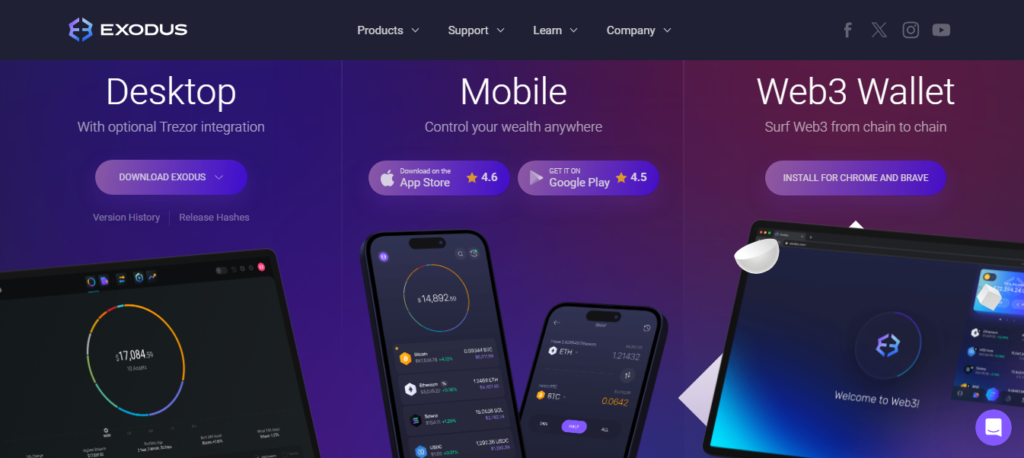
Exodus is a beginner-friendly crypto wallet that combines functionality with an intuitive design. It supports over 200 cryptocurrencies and offers desktop, mobile and Trezor hardware wallet integration. Exodus is particularly known for its visually appealing interface which includes portfolio tracking and in-wallet trading features.
This best crypto wallet offers a built-in exchange that allows users to swap assets without leaving the wallet at all. Moreover, its portfolio tracking system provides detailed insights into asset performance, making it ideal for beginners and casual investors. The wallet also supports staking for various cryptocurrencies including ADA and SOL.
Exodus uses local encryption to store private keys on the user’s device which ensures they are never exposed to online threats. The wallet also provides a 12-word recovery phrase for account recovery but lacks advanced security measures like 2FA or multi-signature support.
Features
- Built-In Exchange: The wallet includes an integrated exchange feature that allows users to swap cryptocurrencies. This eliminates the need for third-party exchanges.
- Portfolio Tracking: Exodus provides a portfolio tracker that visually displays your holdings and their performance. This helps users make informed decisions based on real-time data.
- NFT and DeFi Support: Exodus has added support for NFTs and DeFi apps, making it more versatile. You can access Web3 services directly through the wallet.
- No Registration Needed: Exodus doesn’t require users to create an account, preserving anonymity. This feature is valuable for privacy-conscious individuals.
Pros
- Beginner-friendly design and features.
- Offers built-in asset swapping.
- Supports multiple platforms for convenience.
- Regular updates to improve functionality.
Cons
- Lacks advanced security features like 2FA.
- Limited customization for transaction fees.
Trust Wallet – Best crypto wallet for iphone
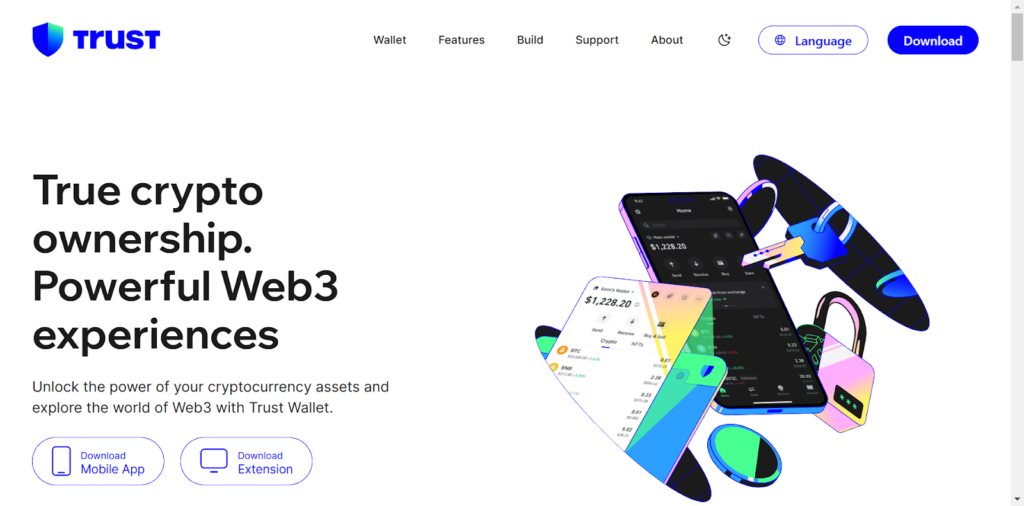
The last one in the list of the top 10 crypto wallets is Trust Wallet. It is a non-custodial mobile wallet well-known for its multi-chain support and simple user interface. Officially endorsed by Binance, it supports over 4.5 million digital assets across 65 blockchains which makes it one of the most versatile wallets available in the market. Trust Wallet is free to use with standard blockchain network fees applicable on all successful transactions.
Trust Wallet also includes an integrated dApp browser, allowing users to explore DeFi platforms and NFT marketplaces. It also offers staking options for several cryptocurrencies, including BNB and ETH directly within the app. Another standout feature of this crypto wallet is its native token, TWT, which offers additional benefits like discounts and governance rights.
This wallet is non-custodial which means users retain full control over their private keys. Like all other crypto wallets, Trust Wallet also uses a 12-word recovery phrase for wallet restoration and doesn’t collect any personal information which ensures privacy. However, as a mobile-only wallet it lacks support for hardware wallet integration.
Lastly, if you want to win a share of $320,000 in prizes, come and celebrate the “12 Days or Crypto” with Trust Wallet and Intract.io. All you need to do is complete some fun daily quests for a chance to win your share of the mega prize.
Features
- Multi-Asset Support: Trust Wallet supports over 4.5 million digital assets across 65 blockchains. This wide coverage makes it one of the most versatile wallets available.
- Integrated Staking: Users can stake tokens like BNB, ADA, and SOL directly within the app to earn rewards. It’s ideal for both new and experienced investors.
- Built-In dApp Browser: The wallet includes a dApp browser, allowing users to explore decentralized apps. It’s an all-in-one gateway to the crypto world.
- Non-Custodial Wallet: The wallet is non-custodial which means you have full control of your private keys. This wallet is perfect for users who value control over their assets.
Pros
- Supports a vast range of assets and blockchains.
- User-friendly interface ideal for beginners.
- Includes staking and dApp access.
- Regular updates and feature expansions.
Cons
- Mobile-only, no desktop or hardware wallet support.
- Lacks advanced security features like multi-signature options.
Factors to Consider When Choosing a Crypto Wallet
The crypto wallet you choose is a significant decision, impacting security, usability, and asset compatibility. Each of the top 10 crypto wallets has different features, so the best one depends on your use case.
Here are the key factors to keep in mind before you decide.
1. Security Features
Security should always be your top priority when selecting a crypto wallet. A good wallet must include:
- Two Factor Authentication (2FA)
It adds an extra verification step to prevent unauthorized access. - Biometric Verification
Fingerprint or facial recognition enhances security for mobile wallets. - Private Key Control
Non-custodial wallets ensure that only you can access your funds. - Cold Storage Options
Hardware wallets like Ledger and Trezor provide offline security while reducing hacking risks.
2. User Experience
An intuitive interface is crucial, especially for beginners navigating the crypto space. The top 10 crypto wallets vary in complexity while MetaMask and Trust Wallet cater to DeFi users, Coinbase Wallet and Exodus offer simple designs suited for newcomers. You should look for;
- A clean and user-friendly interface.
- Easy navigation for sending, receiving, and swapping assets.
- Compatibility with different devices like desktop, mobile and browser extensions.
3. Supported Cryptocurrencies
Not all wallets support every cryptocurrency, so you need to make sure that your chosen wallet is compatible with the assets you plan to store.
- Multi Chain Support is available in wallets like Trust Wallet, Binance Wallet, and SafePal for users who hold multiple tokens.
- Ethereum and DeFi Compatibility make MetaMask a great choice for users focused on Ethereum-based assets and decentralized applications.
4. Customer Support
Having access to good customer service can make a big difference, especially if you run into issues with transactions or security. A reliable wallet should provide the following:
- 24/7 Support: This is useful for those who need immediate assistance.
- Detailed Help Centers and FAQs: They can guide you through common problems without needing to contact support.
- Community Forums: Where experienced users and wallet providers share updates and solutions.
What Is the Best Cryptocurrency Wallet For You?
Choosing one from the top 10 best crypto wallet depends entirely on what you need, your preferences and level of experience with digital assets. Wallets generally fail into three main categories: hardware wallets, desktop wallets, and mobile app wallets.
Each type has its own benefits and drawbacks, making some more suitable for certain use cases than others. Let’s explore the differences:
1. Hardware Wallets
Hardware wallets are physical devices designed for securely storing your private keys offline. They are considered the most secure option for holding cryptocurrencies.
Best For: Long-term holders, high-value investors, or anyone prioritizing security.
Examples: Trezor, Ledger Nano X.
Choose a hardware wallet if you want:
- Maximum security for your assets.
- To store cryptocurrencies offline and away from potential online threats.
- Protection from hacking, phishing, and malware attacks.
2. Desktop Wallets
Desktop wallets are software applications installed on your computer. They offer a balance between security and convenience but are vulnerable to malware and hacks if the device is compromised.
Best For: Casual users or those managing moderate crypto portfolios.
Examples: Exodus, Binance Wallet (desktop version).
Choose a desktop wallet if you want:
- Easy access to your assets while maintaining control over your private keys.
- Advanced portfolio management features.
- To manage multiple cryptocurrencies within one interface.
3. Mobile App Wallets
Mobile wallets are apps designed for smartphones, offering the convenience of managing your crypto on the go. They are ideal for everyday transactions but require users to prioritize device security.
Best For: Beginners, NFT traders, and users making frequent transactions.
Examples: MetaMask, TrustWallet, Coinbase Wallet.
Choose a mobile wallet if you want:
- A user-friendly interface with easy setup.
- Quick access to DeFi platforms, NFTs, and token swaps.
- A wallet that integrates seamlessly with dApps and supports multi-chain assets.
Recommendations
- For Maximum Security: Use a hardware wallet like Trezor or Ledger Nano X.
- For Advanced Features and Customization: Opt for desktop wallets like Exodus for portfolio tracking and multi-asset management.
- For Everyday Use and Convenience: Choose mobile wallets like MetaMask or TrustWallet to access DeFi and NFTs with ease.
Conclusion
Choosing the right wallet from the top 10 crypto wallets can significantly impact your cryptocurrency journey. Each wallet offers unique features ranging from MetaMask’s DeFi integration to Ledger’s offline security. The best choice mostly depends on your specific needs whether it’s user-friendly access, multi-chain compatibility or maximum security for long-term holdings.
For beginners, Coinbase Wallet and Trust Wallet are excellent starting points. Advanced users or long-term holders should consider hardware options like Ledger or Trezor for added protection. Remember, research thoroughly and always use strong security measures to protect your assets.
Investing in the right wallet not only protects your crypto but also ensures a smooth and efficient experience in the ever-evolving crypto world!

 Learn
Learn  April 14, 2025
April 14, 2025  46 min.
46 min. 









